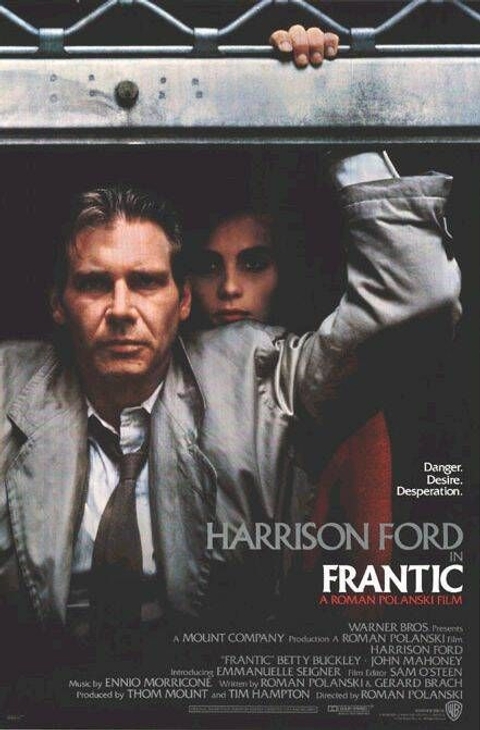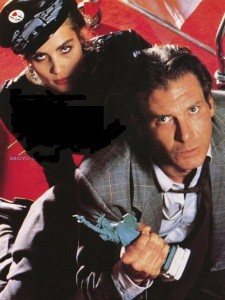Polanski Special: Lovelockandload Get Frantic | DaysAreNumbers

We welcome back our mate Paul from the wonderful Lovelockandload, who opens his 2010 account for us* with an in-depth look at one of Roman Polanksi’s often overlooked films, Frantic. So without much further ado, here’s Paul gettin’ all, y’know, ‘Frantic’….
The eighties were something of a quiet time for Roman Polanski: well, at least in terms of making films. He had ended the decade previous on something of a high with his adaptation of Thomas Hardy’s Tess in 1979 but between that and 1992’s dark comedy/drama Bitter Moon Polanski made just two films: the critically-derided box office bomb Pirates and the somewhat conventional-looking Frantic.
With a mainstream-friendly plot and starring Harrison Ford, hot from the success of the Star Wars and Indiana Jones franchises, one would guess that Frantic was the closest thing to a sure-fire winner the exiled filmmaker could have come without hopping on a plane back to Los Angeles. On paper the film sounds very familiar: American doctor Richard Walker (Ford) is sent into a spiral of despair when his wife Sondra (Betty Buckley) disappears shortly after checking into a Parisian hotel. Arriving in Paris for a seminar, the jet-lagged couple discovers that Sondra mistakenly grabbed the wrong suitcase at the airport and when Walker emerges from the bathroom having been in the shower, his wife has vanished. Minutes segue into hours, with very little information to go on and unaided by the sympathetic, but equally stumped local police, Walker soon finds himself drawn into a dark, seamy underbelly of the French capital that’s a million miles away from the romanticism for which the city is synonymous…

While the plot of Frantic has an air of familiarity there’s a lot of depth to the film that sets it apart from the standard thrillers that were a staple during the 80s. It’s probably the mediocrity of the concept that has prevented Frantic from being afforded the level of respect it deserves and how it has subsequently become the most overlooked entry on the great director’s filmography. Everything—bar one thing that I’ll touch upon later—about Frantic oozes class and a willingness on Polanski’s part to make a mainstream film that works without having to sell himself out: had the film been made by one of the journeyman directors of the time—say John Badham or Adrian Lyne—the film’s look would have been borne out of a need to capitalise on Paris’ best-loved landmarks, but Polanski deliberately avoids this pitfall by ignoring all the obvious places—save for the Eiffel Tower which can be glimpsed in a longshot towards the end of the film—preferring instead to observe parts of the city that had remained largely unseen in English language films. Given that the narrative revolves around Walker’s (ahem) frantic search for his wife, the character has no time to check out the city’s most famous tourist traps anyway, so Polanski asks why should the audience be allowed? Even said longshot of the Eiffel Tower is a carefully considered choice that underlines the structure’s significance throughout the film (spoiler: the suitcase that Walker’s wife accidentally picked up contained a secret mcguffin hidden in a souvenir model of the tower. The tower itself appears during the exchange of said item at the film’s climax to emphasize its importance to the story).
Another way Frantic transgresses from obvious mainstream mediocrity is the way in which Polanski and regular collaborator Gérard Brach shy away from the traditional view of the adversary. The duo prefer instead to focus on Walker’s efforts to locate his wife and his sense of increasing desperation rather than dwell for too long on the villains of the piece or their motives. By concentrating on Walker Polanski and Brach managed to create a fully fleshed-out character that would give Ford an excellent showcase for his abilities. It’s obvious from looking at the Ford’s CV that by the mid eighties he was beginning to distance himself from the heroics for which he had been associated, and came to the film having made two distinctly different films for director Peter Weir: Witness in 1985 and The Mosquito Coast a year later. Frantic continued this trend and Harrison Ford delivers a very layered and fearless performance which, for my money, is the best of his career.

Frantic marked Polanski’s first collaboration with actress Emmanuelle Seigner. The pair would later reteam for Bitter Moon and The Ninth Gate, as well becoming romantically involved and getting married in real life. As Michelle, Walker’s sole ally in the search for his missing wife, Seigner is very affective. The material itself doesn’t require too much range but the actress exudes mystery and sexuality; the audience is never quite sure of her motives or allegiances but she remains alluring throughout.
The film was also Polanski’s first–and to date only—collaboration with renowned Italian composer Ennio Morricone. The score to the film will seem familiar to anyone who’s seen Henri Verneuil’s Peur Sur La Ville (a film that was also scored by Morricone), another Paris-set thriller made a decade before. It’s a great score and with a large helping of accordion, it has a distinctly Gallic flavour. Polanski also utilises various other pieces of music, some to great effect (Grace Jones’s ‘Libertango’, for example) and some less so, such as Mick Hucknall’s ‘I’m Gonna Lose You’ – hey, you should try losing yourself, buddy…
Frantic is a great film that’s aged particularly well for one that was made in the 1980s. If you’ve not seen it, check it out, especially if you’ve ever wanted to see Harrison Ford act. It’s certainly one of the actor’s best films, even if only a minor footnote on Polanski’s list of work. Rumour has it that the studio—Warner Bros.—were less than impressed with Polasnki’s original cut of the film and ordered him to remove twenty minutes of footage seen as surplus to requirement, along with an ending that was replaced with something a little more crowd-pleasing. These rumours are at time of writing unsubstantiated and as the film stands, it’s still a sombre, languidly-paced, character-driven film, which is probably why the film failed to connect with audiences and has subsequently disappeared. Given the prominence of ‘director’s cuts’ and ’special editions’, one would have thought we’d have seen Polanski’s original vision by now, if it’s exists. I guess we’ll probably never know.
Big thanks to Paul for a truly fantastic piece. Be sure to check out Lovelockandload for more movie goodness.
